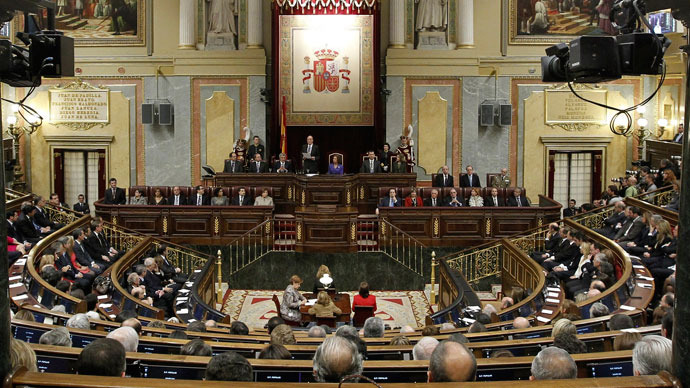INTEREST GROUPS: SPANISH ABORTION NEW LAW

PSOE:
Marta Gomez Gutierrez, Secretary of Equality for the province of Segovia

Presentation of the organisation
Benigno Blanco presented FEF as the grouping of family’s associations created for the latter to have a common voice in the public defence of family’s interests. They organise workshops and conferences with a focus on education and information but also set up demonstrations.
Defend the interests of families
Nothing to do with the Church
The provincial secretary of equality is presented as a source of information for militants, a place for debates and reactions on political actuality on issues related to women discrimination and equality between men and women. The secretary is usually a woman as she knows more about the reality of those discriminations.

Cartoon explaining how difficult it would be if the law was passed
ADRESSING THE ISSUE
Presentation of their reasons
They underline the importance of families in the lives of Spaniards: most people live within families and they are seen as the basis of society, an organisation of huge social interests and efficacy as it provides for goods, education. Yet, despite its importance, families lack media coverage, hence the need for the FEF as a way for families to be more present in the media.
Families as the pillar of society

There is a need to raise socialist activists’ awareness on those issues and react when discrimination looms. They argue that given the political context with the PP in power, the need is even greater for them to be on the lookout.
Framing the message
There is a great emphasis on the foetus as a child. Hence, it needs to be protected as much as the mother – even more as it is weaker – whereas the current situation does not recognize any value to the life of the unborn child before the 14th week. They dismiss the rhetoric of abortion as women’s right as it relies on violence made to another human being.
Furthermore, they argue that the 2010 law does not protect the mother either as it does not offer any alternatives to abortion. They also criticise the ideologisation of society implemented by that law.
Maternity and pregnancy are presented as facts that happen despite the use of contraceptive methods. Hence, they recognize that abortions may happen but argue that its mere existence does not justify legalisation. On the contrary, they argue that prohibiting it lowers the figure.
Finally, commenting on the youth of the participants to their demonstrations, they argue that it is the defence of life that is going to matter in the 21st century, thus framing their opponents as out-dated and presenting themselves as going in the sense of progress.
Protecting both the mother and the child
The killing of an unborn child

2005
Prohibiting abortion decreses its number

As covered in the Spanish media
They present the 2010 law as an efficient one that does not need to be changed, arguing the part about sexual information has actually reduced the number of abortions. Gallardon’s project is presented as all the more unnecessary as there are other priorities, mostly economic.
Furthermore, the PP’s policies are presented as illogical as they cut down Welfare spending while forcing women to give birth to children doomed to suffering – all the more so that spending are reduced.
The emphasis is put on individual liberty: abortion is a choice taken by the couple and the women and not by institutions such as the state and the Church, thus emphasizing relations between the PP and the Catholic Church. The emphasis is put on the right to decide considered as part of the women’s fundamental right to control their body and life: they don’t want to force anybody to abort.
Furthermore, they base their argument on medical legitimacy, arguing they care about the foetus once it recognised as a future human being by doctors; there is a time limit for abortions to be done.
Finally, the idea of regress is emphasised, all the more so that Spain is presented as having been a leader for women’s emancipation on other topics. They use images that refer to the time abortion was illegal such as that of women going to London to abort. Indeed, they also argue that the number of abortions will not decrease as women who can afford it would just go abroad while the other will have unsafe abortions.
Emotions play an important role here, especially when she referred to an experience that happened to someone she was close to.
Un terible retroceso
A personal matter
Legalising abortion does not necessarily increase its number / Prohibiting it does not reduce its number

The graph shows that the number of abortions is not consequently lower when abortion is prohibted BUT that the number of unsafe abortion is significantly higher
The danger of unsafe abortions
In the world

The situation in Spain actually shows a decrease in the number of abortions between 2011 and 2012, most probably thanks to the effort on sexual education implemented by the law passed in 2010

Sexual education, as planed in the law passed in 2010 is key. Indeed, this graph shows that 30% of women who abort didn't use any contraceptive method.
We want the right to decide upon our life and our body.
"We do not want to abort, we want to be able to decide."
Using the experts: "Medical professionals are siding with us"
Pro-choice

In the conclusion of its report on unsafe abortions, the World Health Organization argues for the extension of abortion services.
Almost 2.000 health profesionnals argued that there was no need to change a law that was working
Pro-life
In 2010, the OMC clearly opposed the law, arguing there was no such thing as the right for a woman to abort but that there was a right to life.
Parlimentary process
They emphasise the democratic legitimacy of the parliamentary process. First, it appeared in Rajoy’s program. Second, popular legislative initiatives had already been voted in autonomous parliaments for the protection of maternity, thus showing clear support. This support is also obvious in the number of people in the demonstrations.
Finally, the PP has gained the majority in the Parliament through the democratic process and given the way parties works it makes sense that they voted against the proposition of the PSOE, which he called “ a strategic error”. Stating this, he criticizes the PSOE while remembering PP members of their necessary loyalty.
The PSOE’s goal is clear: they do not want the law to pass and present themselves as using any possible means available. Recently they presented a proposition of law in Congress to push back Gallardon’s project, asking for freedom of vote. A clear message is addressed to the women in PP as they are asked to demonstrate that they are free women and not obedient ones.

Political process
Benigno Blanco argues that there are only a few divisions inside the PP. Likewise, he says that there is no real opposition to that law: according to him, 15 000 demonstrated in Madrid on February, 1st.
Furthermore, basing his argument on ABC’s polling, he argues that there will be no consequences on future elections as other topics matter much more and does not think there are single-issue voters on abortion. He even argues that it can win the PP votes as such a project goes back to the party’s roots.
We have the power of the street
And even in 2013, people demonstrated in favour of Gallardon's project

Subtema

In contrast, El Tren de la Libertad was composed of "elderly" women
2 main directions in which they try to lead the political process:
- European: they say they have gained support from the majority of the European Parliament, including members of the right-wing party and are indeed uphold by all the different socialist parties. They hope this will influence Rajoy as he will realize the law would turn Spain into a European laggard.
- Domestic politics:
o They acknowledge the existence of issue voters that can be particularly concerned about abortion, those voters could have an influence in the upcoming elections and vote against the PP. They argue that a majority of the population opposes the law and most particularly the youth.
o They also frame messages to members of the PP given its divisions; indeed, by pitching the almost far-right conservative neo-liberal against the more democratic part of the PP, saying the latter can influence, they wish to get the most progressive ones to oppose the law. They also address women, prompting them to be more courageous.

You may regret it in the next elections
The debate has successfully been moved onto the European stage
Whether through demonstrations in Europe
Or through debate in the European Parliament

Foro Espanol de la Familia:
Benigno Blanco, President of the Foro

CONTEXT :
In Spain
Historic overview

Facts and figures about the current situation (El Pais)
